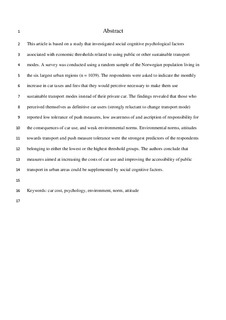| dc.contributor.author | Nordfjærn, Trond | |
| dc.contributor.author | Lind, Hans Brende | |
| dc.contributor.author | Simsekoglu, Ozlem | |
| dc.contributor.author | Jørgensen, Stig Halvard | |
| dc.contributor.author | Lund, Ingunn Olea | |
| dc.contributor.author | Rundmo, Torbjørn | |
| dc.date.accessioned | 2019-11-15T07:29:34Z | |
| dc.date.available | 2019-11-15T07:29:34Z | |
| dc.date.created | 2019-09-17T17:58:42Z | |
| dc.date.issued | 2019 | |
| dc.identifier.citation | Transport Policy. 2019, 83 88-96. | nb_NO |
| dc.identifier.issn | 0967-070X | |
| dc.identifier.uri | http://hdl.handle.net/11250/2628641 | |
| dc.description.abstract | This article is based on a study that investigated social cognitive psychological factors associated with economic thresholds related to using public or other sustainable transport modes. A survey was conducted using a random sample of the Norwegian population living in the six largest urban regions (n = 1039). The respondents were asked to indicate the monthly increase in car taxes and fees that they would perceive necessary to make them use sustainable transport modes instead of their private car. The findings revealed that those who perceived themselves as definitive car users (strongly reluctant to change transport mode) reported low tolerance of push measures, low awareness of and ascription of responsibility for the consequences of car use, and weak environmental norms. Environmental norms, attitudes towards transport and push measure tolerance were the strongest predictors of the respondents belonging to either the lowest or the highest threshold groups. The authors conclude that measures aimed at increasing the costs of car use and improving the accessibility of public transport in urban areas could be supplemented by social cognitive factors. | nb_NO |
| dc.language.iso | eng | nb_NO |
| dc.publisher | Elsevier | nb_NO |
| dc.rights | Attribution-NonCommercial-NoDerivatives 4.0 Internasjonal | * |
| dc.rights.uri | http://creativecommons.org/licenses/by-nc-nd/4.0/deed.no | * |
| dc.title | The role of social cognition in perceived thresholds for transport mode change | nb_NO |
| dc.type | Journal article | nb_NO |
| dc.type | Peer reviewed | nb_NO |
| dc.description.version | acceptedVersion | nb_NO |
| dc.source.pagenumber | 88-96 | nb_NO |
| dc.source.volume | 83 | nb_NO |
| dc.source.journal | Transport Policy | nb_NO |
| dc.identifier.doi | 10.1016/j.tranpol.2019.09.006 | |
| dc.identifier.cristin | 1725874 | |
| dc.description.localcode | © 2019. This is the authors’ accepted and refereed manuscript to the article. Locked until 18.9.2021 due to copyright restrictions. This manuscript version is made available under the CC-BY-NC-ND 4.0 license http://creativecommons.org/licenses/by-nc-nd/4.0/ | nb_NO |
| cristin.unitcode | 194,67,40,0 | |
| cristin.unitcode | 194,67,10,0 | |
| cristin.unitname | Institutt for psykologi | |
| cristin.unitname | Institutt for geografi | |
| cristin.ispublished | true | |
| cristin.fulltext | postprint | |
| cristin.qualitycode | 1 | |

